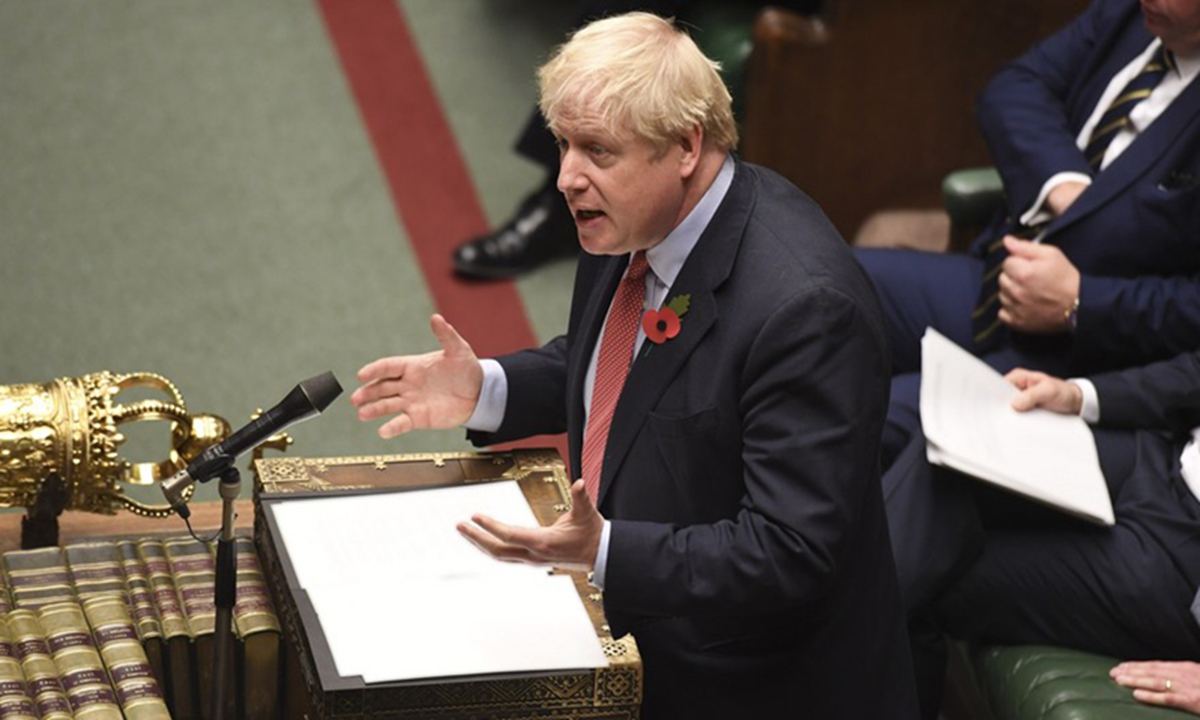
British Prime Minister Boris Johnson speaks at the House of Commons in London, Britain, on Oct 29, 2019. File photo:Xinhua
Stating that he was "fervently Sinophile," UK Prime Minister Boris Johnson seemed ambitious to strengthen economic and trade links with China despite the "occasional political difficulties."When joining with Chinese businesses at a 10 Downing Street roundtable earlier this month, he also signaled that he wanted to resume the two formal forums between the two countries - the Economic and Financial Dialogue and the China-UK Joint Trade and Economic Commission, according to a Guardian newspaper report.
The two forums were suspended by the UK in response to China's enactment of the national security law for Hong Kong last year.
Johnson has always attached importance to cooperation mechanisms with China regarding economy and trade. When he was London mayor, he visited China in 2013 with a trade mission. During his first year as prime minister, he was keen to boost bilateral trade ties too. Even with the pressure from then US president Donald Trump, Johnson still granted Huawei a limited role in UK's 5G mobile network.
But still, despite Johnson's hope that his country and government do not "lurch into a position of unthinking sinophobia," the China-UK relationship has gone from a golden era to a deep freeze. The UK made a series of provocative moves against China during the past two years. It in the end banned Huawei from its network, opened a path to citizenship for Hong Kong secessionists, and pulled the broadcasting license for China Global Television Network.
Recently, it began pointing its fingers at Xinjiang affairs and mulling proposals that would allow UK courts to advise parliament whether or not a genocide is under way in the region. On Monday, the UK called for the UN to be given "urgent and unfettered" access to Xinjiang to investigate so-called human rights abuses there.
All these provocations are adding difficulties to strengthen economic trade links between China and the UK, because London is sending a mixed message toward Beijing.
With all those anti-China moves and against the backdrop of the COVID-19 pandemic and the power transition in the US, the UK has adopted a stronger pro-US posture and broken the previous balance it had found between its economic interests with China and its special partnership with the US. Johnson was the first European leader to speak to US President Joe Biden since the latter's inauguration and positioned himself as a champion of the transatlantic alliance.
The UK should look to the fate of Australia for some clues of what not to do. While there is no argument for sliding away from the US alliance, Canberra has pursued a one-dimensional, loosely thought-through "confronting China" approach, regardless the close economic relationship it has with China. But London should have seen that Beijing did not buy it and in the end, Canberra sacrificed the country's own interests. It will only be too late before the UK realizes that it needs China.
On China's social media, some netizens contend that "fervently Sinophile" Johnson is actually avid of China's money - while his loyalty to the US will never waiver. It seems that UK politicians have become mentally split on the path of currying favor from both sides. The UK, as cunning as always, behaves like a pirate with suits. Johnson, resembling Trump, is just as unpredictable as the former US president.
"The tendency of the UK's diplomatic opportunism and adventurism is enhancing," Cui Hongjian, director of the Department of European Studies, China Institute of International Studies, told the Global Times on Monday.
Post-Brexit UK still wants to play the role as a major power, which has been its long-held international position. But its limited strength in reality is obvious. After Brexit, the influence that the UK once had on the EU is waning. The EU's importance to the US outweighs that of the UK to Washington. Therefore, the UK hopes to increase its strategic importance to the US by ratcheting up anti-China moves and leaning more toward the US-UK special relationship. This will inevitably generate negative impacts on China-UK economic and trade cooperation.
There is room for more China-UK economic and trade cooperation. But it depends on how the British government balances its diplomacy. It is hard to completely separate politics from economics in this bilateral relationship. When it comes to China's core interests, territorial sovereignty and security, Beijing will not step back.
British Foreign Secretary Dominic Raab has offered to visit Beijing to seek cooperation on Hong Kong. But his offer has not been accepted by Beijing, according to media reports.
Wang Zhanpeng, a professor from the British Studies Centre of Beijing Foreign Studies University, told the Global Times Monday that if the UK fails to understand China's sovereignty over Hong Kong and the importance of Hong Kong's stability to China, even if there is communication between the UK and China, the effect will be limited.
The author is an editor of the Global Times. wangwenwen@globaltimes.com.cn

